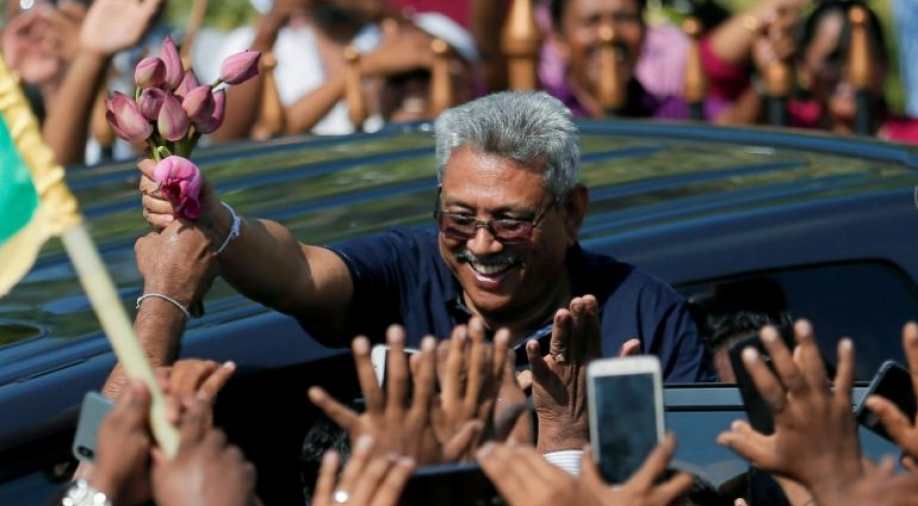Subscripe to be the first to know about our updates!

Sri Lanka: Gotabaya Rajapaksa’s election victory sparks fear among minorities
Andreas Johansson
Gotabaya Rajapaksa was elected as Sri Lanka’s new president in elections on November 16 after winning 52 per cent of the votes for the Sri Lanka People’s Front party – 10 per cent more than his closet rival. This election was the first since the Easter bombing attacks that shocked the country in April 2019.
Known as Gota, Rajapaksa is a former defence minister and brother of Sri Lanka’s two-time president Mahinda Rajapaksa. After his successful presidential campaign, Gotabaya Rajapaksa, who also is a US citizen, was congratulated by world leaders and promised to serve Sri Lanka’s people of all religions.
Throughout his campaign, Rajapaksa stressed that national unity is a priority and claimed he was running the first-ever carbon sensitive electoral campaign in the world. He also promised to deal with the country’s huge debt.
But Rajapaksa’s win has raised concerns among opposition and minorities in the country, who claim that it might increase ethnic tensions in Sri Lanka.
Divided history
The first reason for these fears is linked to the end of the civil war, which lasted from 1982 to 2009. The war was between militant groups from the Tamil minority who wanted to create a separate Tamil nation and the Sri Lankan army. Gota was the minister of defence as the war drew to an end and he became a controversial figure when he and his brother were in charge of the brutal campaign that led to the end of the civil war in 2009.
In the last few months of the war, when the Sri Lankan army made its final offensive against Tamil militants in the northeast of the country, up to 40,000 people may have been killed, leaving Sri Lanka’s Tamil minority dealing with an immense trauma. The end of the war, May 18, is now called the remembrance day of the Tamil genocide.
Gotabaya has been accused of being a “war criminal” by international law experts because of the way the war ended and a United Nations report concluded there was credible evidence of war crimes committed by both the Tamil militants and the Sri Lankan government.
The former Rajapaksa regime might still face charges related to the end of the war, but there are now fears that the Rajapaksa family will not be held accountable for alleged human rights violations. Gotabaya was facing charges of torture in the US connected to his time as minister of defence, but the charges were dissmissed in mid-October because he had immunity under US law.
The opposition and minorities are also worried about press freedom now the Rajapaksa family has made a political comeback. Gotabaya and his brother were nicknamed the “predators of press freedom”: between 2004 and 2010, 44 journalists and media workers were killed in Sri Lanka – most of them Tamil speaking. Nevertheless, in an interview in late 2018 with the Swedish journalist, Johan Mikaelsson, Gotabaya denied that any Tamil journalists were killed during his time as minister of defence.
Muslim fears
Sri Lanka’s Muslims, the country’s second-largest minority, are some of the most concerned about Gotabaya’s presidency. The Muslim population of Sri Lanka makes up 9.7 per cent of the nearly 22m inhabitants. Most of the Muslims in Sri Lanka are Sunni and speak Tamil as their mother tongue.
I have conducted research analysing Muslim politics in the country since 2006, and most of the politicians that I have talked with preferred other presidential candidates over Rajapaksa.
During his presidential campaign, Gotabaya promised to clamp down on Islamic extremism and said he would put national security above all else. This issue was particularly important in the election after the April 2019 terrorist attack in Sri Lanka on Christian churches and luxury hotels in which at least 259 people were killed and more than 500 injured. The attacks were carried out by Sri Lankan citizens, members of local groups National Thowheeth Jama’ath and Jammiyathul Millathu Ibrahim, who had sworn alliance to Islamic State.
Days after the attack, Gotabaya criticised the former president, Maithripala Sirisena, and the national security in the country, and promised that he was the right man for the job of keeping Sri Lankans safe.
After the Easter bombings, Muslims were attacked by angry mobs several times. There are now fears that Gotabaya’s hard line against Islamic extremism could spark more anti-Muslim sentiment.
In the years after the war, hardline Buddhist groups such as the Bodu Bala Sena (BBS) targeted Muslims and Christians in different campaigns, some of theWhile the presidential elections were largely peaceful, there were some incidents of violence, including a gun attack on a bus full of Muslim voters.
Rajapaksa’s lack of support among minority groups could be seen in the breakdown of the election results. In the northeast of Sri Lanka, where most of the Tamil and Muslim minorities live, Rajapaksa’s main opponent Sajith Premadasa received most votes. Still, the Rajapaksa brothers remain popular in Sri Lanka’s Sinhalese majority areas.
The first sign of changes in parliament are already here, the prime minister, Ranil Wickremesinghe, resigned and Gotabaya named his brother, Mahinda, to take over. In 2020, Sri Lanka will have parliamentary elections and there is a good chance that the Rajapaksa family will strengthen its power base. By then, it should have become a bit clearer what Gotabaya’s victory will mean for the country’s minorities.m violent. In the past, Gotabaya had publicly appeared at a BBS event, but more recently has denied links with the group. The agenda of these Buddhist groups is to protect what they consider the holy land of Buddhism, Sri Lanka, from foreign elements. In 2014, the ethnic tension lead to riots between Muslims and Buddhists, and four Muslims were killed in the south of the country.
source: WION